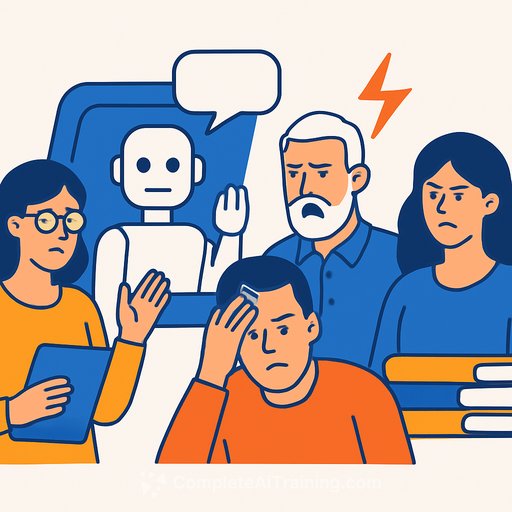Kimi K2 Thinking: Is This the First AI That Actually Writes With Taste?
Markets whipsawed this week, erasing roughly $1T from AI heavyweights like NVIDIA, Microsoft, Palantir, and Oracle. Fuel on the fire: OpenAI's massive funding chatter and walk-backs, fresh U.S. export curbs hitting NVIDIA's China chips, and Beijing steering state-funded data centers to domestic accelerators. Add big debt raises (Meta, Oracle), bank CEOs warning of a 10-15% correction, consumer sentiment near multi-year lows, and Michael Burry shorting NVIDIA and Palantir.
Some investors call it a necessary reset after a long run-up. For writers, the signal is simpler: ignore the noise, track the tools that compound output, and keep shipping. The standout this week is Moonshot AI's Kimi K2 Thinking.
What happened in AI (writer edition)
- Moonshot AI released Kimi K2 Thinking, an open model built for long, stable reasoning.
- Microsoft formed the MAI Superintelligence Team to pursue domain-specific systems that stay controllable.
- The U.S. tightened export controls, blocking NVIDIA's scaled-down China chips; China pushed state-funded data centers to use domestic accelerators.
- Box CEO Aaron Levie predicts 95% of AI agent usage in five years will be new work humans never did before.
Kimi K2 Thinking, in plain English
Most models write like cramming for a test: fast, competent, and boring. Kimi K2 Thinking is different. It can think through ~300 steps without losing the thread, stay on theme, and - shocker - make creative calls that feel intentional.
- Performance: Reported to outscore GPT-5 on expert reasoning (44.9% vs 41.7%) and trounce humans on web research tasks (60.2% vs 29.2%).
- Economics: Trained for about $4.6M - competing with projects that spend orders of magnitude more.
- Creative edge: Generated 1,595 "thinking" tokens for a single sentence (DeepSeek used ~110), which helps with novels and long-form continuity.
- Access: Use via API for pennies (about $0.01 for a 2,000-word story), through OpenRouter, or run a 245GB compressed build locally.
- Real test: Co-wrote a YA novel, "The Salt Circus." It revised itself, scrapped weak ideas, and showed actual taste.
- Context: China's open models (DeepSeek, Qwen, Kimi) are closing the gap with closed U.S. labs to ~4-6 months and releasing faster, according to researcher Nathan Lambert.
Fun fact: those 1,595 thinking tokens were for a single sentence about cheese. Overkill? Maybe. But if you write fiction, you want that obsessive chain of thought working for you.
How to put K2 to work in your writing practice
- Outline with thinking tokens: "Think step by step through theme, stakes, and voice. Don't write prose yet. Give me a 15-beat outline with alternatives and risks."
- Voice primer: Feed 3-5 of your best pieces. Then: "Extract my voice: syntax, pacing, idioms, tone, and taboos. Summarize as rules. Ask 5 clarifying questions."
- Scene scaffolds: "Before drafting, list character motives, hidden tension, sensory anchors, and a misdirect. Show your reasoning."
- Self-revision loop: "Write 600 words. Now critique your own work on clarity, pacing, cliché density, and specificity. Cut 15% and rewrite. Show before/after."
- Continuity control: Keep a living "Story Bible" the model updates each chapter: character facts, timeline, tone constraints, foreshadowing seeds, unresolved threads.
- Research with receipts: "Plan a 30-minute research sprint. List sources, extract quotes, provide citations, and mark uncertainty. No claims without evidence."
- Local runs: If you need privacy or longer sessions, run locally. Cache the story bible and voice rules for stable long-form work.
The prompt that teaches you anything
Save this as a standing project and reuse it to study papers, genres, or style guides:
"Help me understand this paper step by step. Go from high level (simple explanations) to incredibly low-level, detailed technical explanations until I understand it. Do not advance without confirming that I understand each step with a quiz question first."
Why this matters for writers
Nathan Lambert's read on Moonshot, DeepSeek, and Qwen: open labs release faster, the performance gap shrinks to months, and public models are what people actually use. If speed and access win, your edge won't be secret models - it will be process, taste, and IP. The writers who productize their workflow (prompts, bibles, QA checklists) will run circles around those waiting for "the perfect model."
Related research on capability growth and task horizons: METR.
Around the horn (context for your creative bets)
- Export controls tighten: NVIDIA's scaled-down China chips were blocked; China pushed state data centers to domestic accelerators. Translation: expect rapid capability jumps from Chinese stacks - plan for model diversity in your tools.
- Microsoft's MAI team: Aiming for controllable, domain-specific AI. For writers, niche assistants (story structure, legal review, rights tracking) will multiply.
- Agent future: Aaron Levie says 95% of agent usage will be new work. Think: auto-updating story bibles, continuity audits across franchises, rights metadata cleanup - work humans skipped because it was too time-consuming.
- Productivity curve: Research suggests task horizons are shortening fast; even conservative automation can compound output over a decade.
Sunday special: add a smile to the draft queue
- Cat finds helium tank, immediately regrets it.
- Cat commits its first felony at Target.
- Chef Boyardee's worst day in a Walmart parking lot.
- Santa causes massive traffic jam, nobody knows how to feel.
- Fog clears on the battlefield, everyone knows they're screwed.
- POV: your ring camera when a bunch of cats team up to prank you.
Do this this week
- Test Kimi K2 via API or OpenRouter. Co-write 1,000 words and run a self-critique loop.
- Set up the "teach me step by step" prompt as a reusable project. Use it to study a genre or a research paper you've been avoiding.
- Build a voice primer from your best work and store it with your story bible. Reuse on every draft.
- Audit your writing pipeline for "work we never did": continuity checks, rights metadata, citation validation - hand them to an agent.
- Browse curated tools and prompt workflows for writers here: AI Tools for Copywriting and Prompt Engineering.
That's all for today - keep your process tight, your drafts moving, and your taste in the driver's seat.
Your membership also unlocks:






